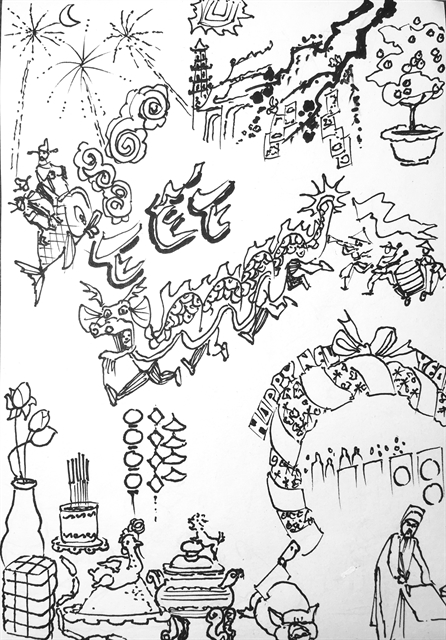
Illustration by Trịnh Lập
by Nguyễn Mỹ Hà
"Mỗi năm hoa đào nở (Each year when peach trees are in bloom)
"Lại thấy ông đồ già (Again the elderly teacher re-appears)
"Bày mực tàu giấy đỏ (Displaying his Chinese black ink and red paper)
"Bên phố đông người qua... (On the pavement of a crowded street)...
This classic poem by poet-teacher Vũ Đình Liên (1913-1996) represents nostalgia for the age-old traditions and customs, the good old days that have been fading as a new westernised lifestyle takes over.
Penned in 1936, the poem Ông đồ (The Han Script Teacher) appeared early after the French colonisation of Indochina, in which, three regions of today's Việt Nam were known as Tonkin, Annam and Cochinchina. The Confucian scholar, who symbolises the ancient roots of Oriental philosophy, traditions, and fundamental societal norms, in the poem was described by Liên as being marginalised by the increasing Western influence on society.
The way society used to function was slowly fading, its Han Chinese and Vietnamese ancient Nôm ideographic writings were swept away by growing Western influence, when Portuguese missionaries used the Latin alphabet to phonetically record Vietnamese sounds.
The old royal exams held from the district up to royal court level were abolished, which led to the less important status of ideographic script scholars. They went from being one of the pillars of society to being sidetracked and gradually losing their power.
Ever since the French invasion, the Eastern roots and Western reality never stopped elbowing each other to win over the Vietnamese populace.
But now a positive decision shows that the East with its long traditions must be respected and not overlooked on the international level.
The United Nations General Assembly in late December acknowledged the significance of the Lunar New Year and invited the UN agencies at headquarters and other duty stations to avoid holding meetings on the Lunar New Year.
Earlier, an appeal calling on the UN top leadership to recognise the world's cultural diversity was co-signed by Brunei, Cambodia, China, Indonesia, Laos, Malaysia, Mauritius, the Philippines, South Korea, Singapore, Thailand, and Việt Nam.
The Lunar New Year usually falls in late January or early February of the Gregorian calendar, and is celebrated by about one-fifth of the world's population.
This official recognition by a world organisation shows not only the contribution of Oriental culture to the world, but also puts an end to a seemingly never-ending dispute of whether to keep celebrating the Lunar New Year or only celebrate the Gregorian New Year.
The Lunar New Year side wants to keep the traditions of following the weather and seasonal changes for agriculture and farming purposes. They also tend to respect traditions and follow customs from the forefathers' generations without questioning them.
You may notice that Japan was not on the list of countries that wanted the Lunar New Year be recognised by the UN. This is what those against Lunar New Year base their argument on: a strong country like Japan doesn't even celebrate the Lunar New Year.
Agriculture Professor Võ Tòng Xuân said "If you want to cling to the Lunar New Year, our country will forever stay poor!" When he said this famous line back in 2006, he meant that we only need to celebrate New Year once.
He was saying that from December 31 until the Lunar New Year, for a few weeks, work slowed down in Việt Nam as everyone was preparing to greet the Lunar New Year, by celebrating again and again. According to Prof Xuân, it's a waste of resources.
Having spent all his life studying the rice plant, living with the farmers and helping export Vietnamese rice all over the world, Xuân, who was awarded VinFuture prize only a few weeks ago, certainly knows what he was up against.
We need to be clear not to misinterpret his message.
Lunar New Year is deeply rooted in our culture, but we need to see that bad practices can hinder our people on an individual level, and our country as a whole.
Some of the bad habits on Lunar New Year include overdrinking and getting drunk, drink-driving, burning firecrackers, and intense gambling, either during the holiday, or even the whole first lunar month.
The first month of the Lunar New Year is usually dubbed the 'hanging around month', as everyone starts to visit pagodas, shrines and temples, and not much gets done.
Xuân was quoted as saying that we should not abolish the Lunar New Year, but only have three days off, then go back to work.
Not everyone welcomed the UN news as positive.
"Many traditional customs have faded, such as customs for the days leading to Tết or during the month after it. Tết, or Lunar New Year today has only one good thing, it pushes people to spend money to keep the economy growing. But it would be hard on workers and small-scale farmers because too many holidays means their savings shrink," said a social worker.
The law has it that companies should still let workers have public holidays off with pay, but they can cut the payments. It won't affect you if you have accumulated significant savings, but if you live hand to mouth, it's really hard to maintain your job, especially if you have children at school or in college.
Some companies offer an open choice for their workers so that those who quickly want to go back to work can do that for extra income.
Too much swing either way will neither be good for society or mental health, nor the economy. Having a long holiday, like partying too much, could have a negative impact. Even joy, or nostalgia for the good old days, needs to be consumed in moderation. VNS
OVietnam